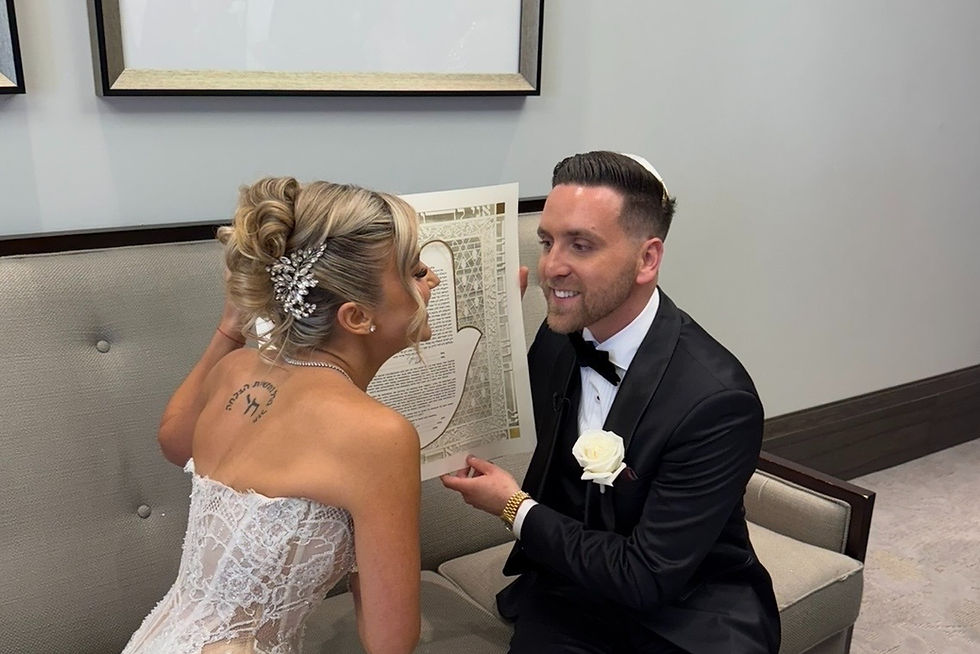The Power of Words: Plant Seeds or Scatter Them – A Lesson I Learned from a Rabbi’s Seeds
- Ben Silverberg
- Jul 16, 2025
- 4 min read
Updated: Sep 15, 2025
By Cantor Ben – Jewish Wedding Cantor, Toronto | Founder of CoolCantor Hebrew School

⸻
Hi, I’m Ben from CoolCantor—and today, I want to share something I wish every parent taught their child early:
Words carry power. Choose them like seeds you plant.
⸻
🌱 Let Me Tell You a Story…
A boy once said something mean and immediately regretted it. He went to his rabbi and asked, “How do I take it back?”
The rabbi gave him a bag of seeds and said:
“Go scatter these in the wind.”
The boy obeyed and returned with the empty bag. The rabbi then instructed:
“Now go collect every seed you scattered.”
The boy looked puzzled. “Impossible—they’ve blown off, fallen into the dirt, or been eaten by birds.”
“Exactly,” said the rabbi.
“Words are like seeds. Once spoken, you can’t take them
back. Some will grow. Some will lie dormant. And some will do damage
that’s impossible to reverse. That’s why we must choose them wisely.”
⸻
Why This Story Matters
In Judaism, we speak about Koach HaDibbur – the tremendous power of speech. Our words can uplift or crush, heal or harm.
The Torah and our tradition teach that safeguarding our
tongue is central to being a moral human. The Talmud warns that gossip
kills the reputation of three people—the one who speaks, the listener,
and the person being spoken about.
So when we gather for a Jewish wedding ceremony in
Toronto, those sacred words—whether Jewish wedding vows under the Jewish
wedding chuppah, or a blessing at a baby naming ceremony
Jewish-style—must be delivered with intention, love, and care.
⸻
A Life-Coaching Perspective: Words Are Like Toothpaste
Think of words like toothpaste. Once it’s squeezed out, you can’t put it back—no matter how much you try. It stains, it lingers.
But words can also heal:
• A sincere “I’m proud of you” can elevate a child’s confidence.
• A heartfelt apology can mend years of silent walls.
• A word of encouragement can light a path through darkness.
At CoolCantor Hebrew School, guiding students in online
Bar Mitzvah lessons, Bat Mitzvah lessons, and Hebrew education isn’t
only about Hebrew fluency. It’s about teaching them to speak with heart
and intention. We ask ourselves before every lesson:
• Is it true?
• Is it kind?
• Is it necessary?
If not, we pause before speaking—because once words fly, they can’t be unspoken.
⸻
A Real-Life Story: Charlotte & Adam’s Wedding, and the Power of Loving Words
I met Charlotte and Adam, a wonderful Jewish couple from
Toronto, while they were planning their Jewish wedding, and had the joy
of serving as their Jewish wedding officiant. Guided by their vision, we
created a ceremony that intertwined Jewish wedding traditions with
heartfelt moments.
From our first meeting at the Jewish wedding venue, to
selecting their Jewish wedding attire, decorations, invitations, and
music, every detail became an opportunity to speak love, faith, and hope
into their future together.
I was deeply influenced by my mentor—a great Jewish
wedding Rabbi—who taught me that every syllable under the chuppah
matters. I’ve carried that lesson forward in my role as a Cantor: words
spoken here don’t just reach ears—they plant gardens in souls.
⸻
Words That Build a Legacy
1. Speak to Plant Seeds of Love
In your family, speak blessings, encouragement, and gratitude.
When
I officiated Charlotte and Adam’s
, I guided
them to whisper a blessing to each other—just the two of them, broken
lilies of love before the whole community.
2. Silence Instead of Scattering
Teach your child to pause when upset.
I always
encourage students in online Bar/Bat Mitzvah tutoring to stop and choose
words with care—especially under pressure. That pause is the fence
around the speech—like a guardrail on a cliff.
3. Apologize to Heal
When we cross lines, we must build bridges.
Charlotte
wrote a warm apology to her cousin who couldn’t attend the wedding due
to travel issues. The letter warmed the family—and was read as a
blessing at their Jewish wedding reception.
4. Sow Encouragement
Words like “I believe in you” have a compound impact.
During
Jewish baby naming ceremonies, I encourage families to speak hopes into
each child’s heart—planting seeds for a life of purpose.
⸻
🔥 Words Can Warm—or Burn
Words are like fire. In the fireplace, they warm and uplift. Once out of control, they can scorch homes.
Our tradition says to build fences—guardrails to protect speech, and hearts.
⸻
Your Challenge This Week
Challenge
Description
1. Pause Before Speaking
Catch yourself before frustrated words. Speak more kindly—or hold your tongue.
2. Offer a Genuine Apology
Is there someone you need to repair with? Send a sincere, heartfelt note.
3. Share Kind Words
Compliment someone unexpectedly. Watch their face shift—and their heart soften.
Reflection Questions
• Have you ever said something you wished you could take back—and what did you learn from it?
• What’s the kindest thing someone has ever said to you—and how did it make you feel?
• What will you say this week to plant a seed of love, encouragement, or hope?
⸻
Final Thought
Your voice is your most powerful tool. Every word is a seed.
Ask yourself:
“Am I planting something that will bloom beautifully—or regretfully?”
If you’re planning a Jewish wedding in Toronto, a baby
naming ceremony, a Jewish newborn celebrations, or need support guiding
your child in bar mitzvah lessons, Hebrew school, or Judaism classes
online, consider this:
Plant seeds with love. Choose words with care. Speak with intention.
Because the right words can light a life.
And the wrong ones—well, some seeds you can’t ever collect again.
I can’t wait to hear what grows in your week.
Thanks,
Ben




Comments